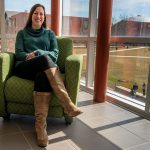As federal lawmakers prepare to debate legislation greatly reducing the use of restraints – and eliminating the use of seclusion – in public schools, a recent hearing of the U.S. House of Representatives Subcommittee on Early Childhood, Elementary, and Secondary Education focused on the use of restraint and seclusion and featured testimony from UConn expert George Sugai. We asked Brandi Simonsen, a professor of special education in UConn’s Department of Educational Psychology at the Neag School of Education and co-director of the Center for Behavioral Education and Research, about the use of restraint and seclusion and whether the federal government has a role to play in regulating their use in public schools.
United States education policy intersected with graduate research Friday morning at the 7th annual graduate research symposium of the University of Connecticut’s Center for Behavioral Education and Research (CBER).
The following PBIS Practitioners Guide — titled National Climate Change: 5 Ways Schools Can Positively and Proactively Support All Students — originally appeared on the OSEP Center on Positive Behavioral Interventions and Supports website and is authored by Neag School faculty Brandi Simonsen, George Sugai, Jennifer Freeman, and Tamika La Salle.
Incidents of bullying and harassment taking place nationwide illustrate the dangerous effects of hate being modeled and reinforced on a national stage, according to a team of UConn school climate and behavior experts. Now spilling into classrooms and schools across the nation, these developments are presenting educators, parents, and communities with significant, immediate challenges as they seek to support students, while faced with their own feelings of stress, confusion, and lack of preparedness.
The year 2016 officially marks a 10-year milestone in the history of UConn’s Center for Behavioral Education and Research (CBER) — a Center based at the Neag School that has, over the course of merely a decade, secured millions of dollars in federal and state grants and contracts; conducted hundreds of innovative research projects; and enriched the lives of many thousands of educators and students around the world.
George Sugai, a professor in UConn’s Neag School of Education and an expert on school climate and student behavior, addressed a conference in February that included Vice President Joe Biden on the topic of making schools safer in the wake of the Sandy Hook School tragedy. Sugai, who in December co-authored a national position paper […]
Rather than react to bullying incidents in schools with heavily punitive policies, a systemic, preventive approach that avoids demonizing students and strengthens the overall climate in classrooms is the way to go, Neag School of Education‘s George Sugai and co-authors advise in a paper prepared for President Obama’s White House Conference on Bullying Prevention held […]
Susannah Everett Susannah Everett is a research associate with the Center for Behavioral Education & Research. Her focus is to support the research and implementation of School-Wide Positive Behavioral Interventions and Supports (SWPBIS) in the Hartford Public Schools, with specific attention on targeted interventions. She will also work with CT State Education Resource Center […]
CBER Team Publishes in Journal of Literacy Research While schools and governments were putting the top priority on teaching basic reading skills to beginners, older students have been faltering on the path to understanding what they’re reading. Two-thirds of eighth- and twelfth-graders read below proficiency, and one-third of high school graduates are not prepared to […]
The inability to recognize even simple terms often leads to serious reading problems later, says Michael Coyne, whose research on reading interventions for kindergarteners, including intensive vocabulary training, is gaining national attention. Coyne, an associate professor in the Neag School’s Center for Behavioral Education and Research (CBER), has won nearly $4.5 million in federal grants […]




